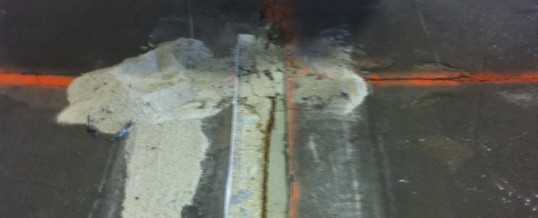
Does your concrete floor have cracks? Almost all concrete floors have cracks and are in need of concrete crack repair; some are very small and caused by excessive drying during the curing process, some are due to either an improper installation or an improper slab design.
Some floors crack even with the best design and installation. The key to fixing any crack in a floor is to first understand why it happened in the first place.
You may not know but almost every floor has expansion and contraction joints cut and placed at regular intervals to control the inevitable cracking that would occur if the joints weren’t placed ahead of time.
Concrete floors and slabs actually shrink when they harden and the joints are placed to control where the cracks occur. That said there are many causes for cracks in concrete floors that are not planned on.
Small surface cracks are usually caused by the top of the slab being allowed to dry out prematurely when the floor is in its initial cure.
Cracks following back towards a corner or a 90% angle are usually created by it being the easiest place for the floor to crack. Many slabs are designed with joints placed in those key locations to avoid this from happening.
Causes of Concrete Cracks
Random cracks can be the result of many causes like excessive weight from racking systems, poor slab compaction at the time of the pour, insufficient slab design for the use, insufficient rebar placement, concrete placed too thin or excessive slab curling. To determine why your slab is cracking it’s important to do a thorough slab survey and look at your current use and traffic patterns.
I visited one floor where the company was storing and moving 20,000 lb paper rolls with a 30,000lb fork truck all day long and was looking for a solution to there excessive slab cracking problem.
It turned out they had rented the building and the concrete was only 4” thick. They were literally breaking the floor down day by day with weight and traffic that floor slab was never designed to be exposed to.
Concrete Crack Solutions
The key to repairing any crack in any working concrete floor is to make sure the crack is stationary and not moving. If you repair a moving crack you will continue to see most or all of your repairs fail over time.
Once you have a stable crack you can then decide on which type of material you should use to repair the crack. There are a lot of products to choose from and each has its best use.
The most important key to the right repair is to hire a contractor who understands all of the above potential causes and who has a number of past jobs references to back up that knowledge.
Concrete cracks are definitely one of the hardest things to repair in a concrete floor and make look nice. Hiring someone with the right knowledge, equipment and crew is critical to the right repair.
Concrete Flooring Service Area
ICS provides concrete solutions to all of the northeast. Here is a small list of cities and towns where we have completed many industrial floor coatings and commercial concrete flooring applications.
| Portland, Maine | Bangor, Maine | Augusta, Maine |
| Nashua, New Hampshire | Manchester, New Hampshire | Portsmouth, New Hampshire |
| Boston, Massachusetts | Worecester, Massachusetts | Springfield, Massachusetts |
| Burlington, Vermont | Montpelier, Vermont | St. Johnsbury, Vermont |
| Providence, Rhode Island | Warwick, Rhode Island | Cranston, Rhode Island |
| Hartford, Connecticut | New Haven, Connecticut | Stamford, Connecticut |
| New York | New Jersey | Pennsylvania |

